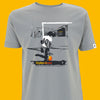Hristo StoichkovCSKAMATA (The Dagger)
Hristo Stoichkov Stoichkov (Христо Стоичков Стоичков), was born 8 February 1966 in Plovdiv, Bulgaria. Nicknamed 'The Dagger' (Камата), he was the key member of the Bulgaria national team - the Golden Generation, that finished fourth at the 1994 World Cup. He was also honoured as European Footballer of the Year in 1994 whilst playing for Johan Cruijff's Barcelona.
Known for his explosive acceleration and speed dribbling, he also excelled at taking free kicks and penalties, and was regarded as one of the best crossers in the world in his prime. Apart from his enormous footballing talent, he was a truly intense character, notable for his aggressive playing style and his furious temper. He could often be seen arguing with the referee or opponents. This gained him huge popularity and disdain in equal measures.
Stoichkov spent his youth career in his hometown, before moving to Hebros in 1984. A year later, he went to CSKA Sofia, where he forged his reputation through 5 turbulent but extremely successful years. At CSKA, he gained the kind of notoriety that would become part and parcel of the player for the rest of his career.
On June 18, 1985, the Bulgarian Cup Final was contested between arch-rivals CSKA and Levski. It was a game marred by a series of disputable referee decisions. This resulted in several brutal fights, some of which involved Stoichkov. CSKA eventually won the game but due to the volatile and unsavory nature of the game, both teams were disbanded. By decree of The Central Committee of the Bulgarian Communist Party, CSKA was renamed Sredetz and Levski was renamed Vitosha. They also banned several players, includingHristo Stoichkov.
It took a year for the Committee to reverse its decision and allow Stoickov to be reinstated. As Sredetz, the club finished in fourth place in 1985-86. The following three years were marked by powerful performances from Stoichkov. He was instrumental in their 1987 and 1989 title successes, and as a result was awarded the European Golden Boot, scoring 38 goals in 30 games. Sredetz were again renamed to CFKA Sredetz (Central Football Club of The Army Sredets), and in 1989 reached the UEFA Cup Winners’ Cup semi finals against FC Barcelona.
Barcelona were coached at the time by Johan Cruiff and although CFKA Sredetz were eliminated, the talent of Stoichkov was not lost on Cruyff and he decided to bring the Bulgarian to Spain the following year. Banned for eight matches in his first season for stepping on a referee's foot, he went on to score 14 goals in the Primera división and six more in the Cup Winners' Cup.
Stoichkov became a key part of Cruijff's 'Dream Team', playing alongside the likes of Michael Laudrup, Ronald Koeman, and most notably, Brazilian striker Romario, with whom he formed a formidable partnership and great friendship. He helped Barcelona to the most successful period in the Catalan club's history.
They won the Primera Division four years in a row between 1991 and 1994 and the European Cup in 1992. Though his relationship with Cruijff became increasingly strained, he was an idol to the club's fans, much like his hero, Diego Maradona.
In addition to being voted athlete of the century in his native country, he was named by Pelé as one of the 125 Greatest Living Footballers at a FIFA Awards Ceremony in 2004.
'I owe a lot to this club and the supporters who were always there for me. They supported me even when I was suspended. We had a great team and great tradition, that's how we became great players.'
Hristo Stoichkov, on his former club CSKA Sofia
'Cruyff combines the qualities of the best coach in the world with the most stubborn character that I have worked with in professional football.'
Hristo Stoichkov
'[Maradona] is the last player I truly idolize... No footballer is more worthy of a number 10 jersey than him. I've seen his feints, shots and goals countless times, yet I never get tired of watching them. I'm just sorry that I never got the chance to play along with Diego on the same team.'
Hristo Stoichkov












